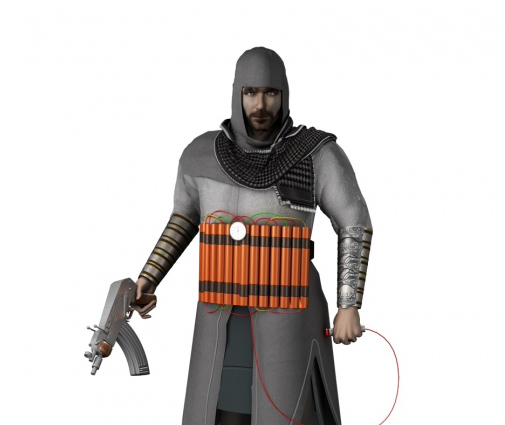This is an archive of the ArtCat Zine, 2007-2009. Please visit our new project, IDIOM.
Wafaa Bilal censored at RPI
Iraqi American video artist Wafaa Bilal's recent exhibition at Rensselaer Polytechnic Institute in Troy, NY, Virtual Jihadi, was closed by the University's administration a day after its initial opening on 5 March 2008. A conservative commentator on the state payroll called for protests to Bilal's exhibition before its opening in the pages of the Troy Record, citing a work based on an incendiary video game exhibited in a university art gallery. The offending work, a video in which Bilal depicts himself as an Iraqi civilian radicalized by his brother's death and driven to join an Al-Qaidea in Iraq cell as a suicide bomber, positions the artist's character in an interactive video game called The Night of Bush Capturing, an Islamist détournement of Hunt for Saddam, an American first person shooter in which a protagonist U.S. soldier makes his way through a virtual world populated by stereotypical Iraqi men in an Odyssean journey to "hunt" and kill former Iraqi president Saddam Hussein. RPI cited concerns that Balil's work may make use of university resources to "provide a platform for what may be a product of a terrorist organization or which suggests violence directed toward the president of the United States and his family." Following the censoring of the exhibition at the university art gallery, Balil seems to have been blacklisted from campus and denied access to university buidlings, despite being RPI's current artist in residence and being assured by the university president that he remains a welcome member of the community regardless of the recent controversy. Balil describes this and more in a recent video interview.
If the chauvinism of the Hunt for Saddam seems underrepresented here, it's likely because it is; reading about it today calls to mind similar popular jingoistic interactive Internet memes and flash animations authored and circulated shortly after September 11 and following the path to war in Iraq, in which players were given a chance to symbolically drop bombs and mark the bodies and homes of an endlessly regenerating population of animated stand-ins for an abstracted and heavily racialized enemy. As Brian Holmes writes, Balil's recent work has been concerned primarily with suggesting potential strategies for representation and sympathy with the Iraqi civilian, a figure often ignored in the popular media depiction of Iraq as a Manichaean arena of pro-Western freedom-fighters and regressive Islamic militants. In a war waged on all fronts — despite President Bush's assurances that sacrifices of the civilian population in this country at least need not be asked — the symbolic plays an ever important role to those geographically and emotionally alienated from the material realities of war.
Bilal's video, Virtual Jihadi, will be on view at the Sanctuary for Independent Media in Troy through 4 April 2008. You can see another one of Bilal's recent web performance projects here.
ZINE
HOME
TIPS / COMMENTS
CATEGORIES
CONTRIBUTORS
- Greg Afinogenov
- B. Blagojevic
- Adda Birnir
- Susannah Edelbaum
- Julie Fishkin
- Paddy Johnson
- Jessica Loudis
- Christopher Reiger
- Andrew Robinson
- Peter J. Russo
- Blythe Sheldon
- S.C.Squibb
- Hrag Vartanian

